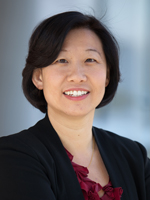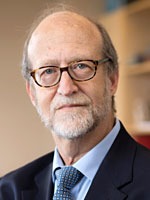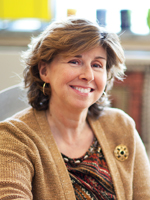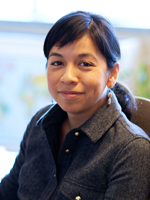

MPH Improves Health Outcomes
The Einstein M.P.H: Using Research and Community Engagement to Improve Public Health
After 16 years in practice, Chinatown pediatrician Dr. Loretta Young Au found herself frustrated. "In a week I see 50 or 60 patients and it feels like I’m sort of hitting a wall. I see a lot of the same problems and I am repeating a lot of the same messages. There are limits to what I can do in terms of prevention and making broader changes."

Dr. Loretta Au, M.P.H. student That’s why she decided to enroll in the Master of Public Health program at Albert Einstein College of Medicine of Yeshiva University, a unique interdisciplinary program that combines a strong research focus with community engagement.
The M.P.H. program, launched two years ago under the Center for Public Health Sciences, is a specialized program that offers individualized attention, hands on experience and a collaborative atmosphere, while preparing health professionals to have a positive impact on health at the individual, community, national and global levels.
The 42-credit interdisciplinary M.P.H. program emphasizes practice-based and community based research in the areas of prevention, chronic conditions, health disparities, and global health with a focus on behavioral and social determinants of health. The master’s is designed for those who already have a graduate degree or substantial experience in public health and seek to deepen their knowledge and maximize its impact.
The student body includes physicians, dentists, nurses, researchers, medical students, program managers, and other professionals – some from non-U.S. cultures – with an interest in public health. The diversity of students adds to the richness of the program.
"We are a small program. That gives us the opportunity to pay very special and individualized attention to all of our students," says Dr. Paul Marantz, associate dean for clinical research education, internist by medical training, and director of the Center for Public Health Sciences who also holds a Master of Public Health. "Every student is assigned a senior faculty advisor with whom they meet regularly to review their curriculum, identify opportunities for elective courses and develop their practicum. This allows students to monitor their progression as they develop their own identity as a public health professional."

Dr. Paul MarantzThe program is structured for working professionals; classes are held first thing in the morning or late in the day, and summer semesters make it possible for full-time students to receive their degree in 13 months, and part-time students in 30 months. "Our program is designed to allow people to keep their day jobs while they learn with us," notes Dr. Marantz. "We depend on that, because our goal is to have our students remain engaged in their professions to enhance their ability to apply what they learn."
Traditional M.P.H. programs focus on the main core areas of public health: epidemiology, biostatistics, environmental health sciences, health policy, health management, and social and behavioral science. "While we embrace and include all of these in our educational program, our focus is very much on public health research," says Dr. Marantz. "Our program aims to improve the health of the public through rigorous community-based research, in order to provide the evidence base we need to inform rational health policy and lead to better health."
In addition to course work, all master’s candidates engage in a practicum that partners students with public health agencies and community-based organizations to learn first-hand what it means to be engaged in public health work. Current M.P.H. students are working with organizations that include the New York City Department of Health, the Bronx District Public Health Office, Urban Health Plan, a community health center in the South Bronx, several small community-based organizations in the Bronx, and public health programs offered by associated healthcare organizations like Montefiore Medical Center, the university hospital and academic medical center for Einstein.
This combination of research and community involvement is key to training tomorrow’s leaders in the health field. "Community empowerment is becoming an integral goal of public health," notes Dr. Cheryl Merzel, associate professor of clinical epidemiology & population health and director of public health education programs and of the Center for Public Health Sciences who holds a doctorate in public health. "We’re no longer seeing ourselves as the experts who have access to all the knowledge and come in to do what people tend to call ‘helicopter research,’ swooping down and imparting our knowledge to communities and then leaving," she says.

Dr. Cheryl Merzel"We see ongoing partnerships with communities as the only way, really, of being able to work together with communities to create sustainable public health action," Dr. Merzel explains. "What we hope to do is train our students to obtain the research skills needed to be able to take the knowledge that’s out there, translate it, and apply it while working collaboratively with community organizations so that it can be used for the benefit of communities."
Though the program can be challenging, the rewards are immediate. "Being part of the Einstein master’s program has really given me the opportunity to use a lot of the skills that I am learning in the classroom directly in my work," says M.P.H. student Claudia Lechuga, who works as coordinator for the New York City Research and Improvement Networking Group (NYC RING) at Einstein.
Ms. Lechuga, who has an M.S. in molecular biology, oversees research project development, organization and implementation, and maintains research project compliance and mechanisms. "We’re developing research protocols that engage the community. Being a student in the M.P.H. program has enhanced my awareness of a more collaborative approach, where making small changes over a large population is a lot more advantageous versus individualized medicine," she says.
The ability to have a larger impact is a key draw for master’s candidates. "If you come into this program, you can begin to identify the problems, develop approaches to fix them, identify or collect the evidence to support an approach, and then become an advocate for that approach and learn how to implement it, how to put it in action," Dr. Marantz notes.

Claudia Lechuga, M.P.H. studentAs an Einstein employee, Ms. Lechuga was able to take advantage of the tuition remission program that is offered to some Yeshiva University employees. The Master of Public Health can also be integrated into a current medical school education, where students graduate in five years and obtain both an M.D. and an M.P.H. degree. Students say they are gaining public health knowledge in addition to leadership skills, which gives them the confidence and passion to become change agents.
For Dr. Au, the Chinatown pediatrician, the program has also had a measureable impact on her thinking. One of her first projects was to undertake a community health assessment in the Bronx. On paper, the South Bronx and Chinatown seemed to have the same health problems; obesity, young onset diabetes, asthma – but the best ways to address these conditions were different. "There were a lot of dynamics in the Bronx that were not captured in the analytical data alone. It was really a meshing of community strengths, including faith-based groups and the people themselves. I learned that you can not take data and incorporate it without looking at patients and the community in which they live to put together a better picture for thinking about solutions."
Dr. Au has two chief goals. First, she’d like to take the knowledge gained in the Einstein M.P.H. program to her clinical practice. "I just want to do my job better. I think that we doctors need to understand that there’s only so much we can do with medications. Prevention is important," she stresses.
Her second goal is to become more of an advocate in the larger community. "I think all doctors need to take a bigger role in terms of reform, cost savings and efficiency. We’re really not addressing how to improve health in general," she says.
In addition to the master’s program, the center offers a variety of options in public health education. The Public Health Certificate Program provides an introduction to public health in an 11-credit program that can be completed over two semesters. Credits earned can be applied to the M.P.H. for those students who are accepted into the program.
The Global Health Certificate Program, a new offering, comprises a series of graduate-level courses in global health and focuses on social and behavioral determinates of health with an emphasis on health inequities and the challenge of addressing health issues in resource-poor settings.
In addition, the Summer Institute in Global Health provides both college and health professions students (e.g., psychology, medicine) with exposure to the impact of globalization on physical and mental health. Three weeks of classroom work in the Bronx is followed by three weeks of field work in a developing country, including India and Israel, where students engage with local medical students to explore cultural and behavioral influences on health, as well as other perspectives on health and healing.
For more information on all of these programs, visit: http://www.einstein.yu.edu/centers/public-health-sciences/ Applications for all 2012 public health programs are now being accepted.
Posted on: Tuesday, November 8, 2011

Tablet Blog